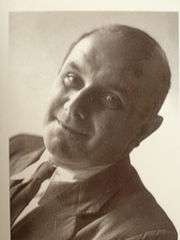|
Biographie StanisÂģaw Jerzy Lec
StanisÂģaw Jerzy Lec (6 March 1909 â 7 May 1966) (born Baron StanisÂģaw Jerzy de Tusch-Letz) was a Polish poet and aphorist of Polish and Jewish noble origin. Often mentioned among the greatest writers of post-WW2 Poland, he was one of the most influential aphorists on the 20th century.
Lyrical poetry, sceptical philosophical-moral aphorisms, often with a political subtext.
He was born on March 6, 1909 in Lviv (then Lemberg, Austro-Hungarian Empire), the son of the Baron Benon de Tusch-Letz and Adela Safrin. The family moved to Vienna at the onset of First World War, and Lec' early education was received there. After the war the family returned to Lviv-Lemberg to continue his schooling at the Lemberg Evangelical School. In 1927 he matriculated at the Lviv's Jan Kazimir University in jurisprudence and Polish.
As a result of his political activities â writing articles for socialist revolutionary periodicals, making speeches in the Technological Instituteâs Yellow Hall â Lec had to leave his hometown Lwow for Warsaw. There his works quickly became popular, but the âliterary cabaretâ he founded in collaboration with Leon Pasternak (cousin to the writer of Dr. Zhivago), was closed by authorities after eight performances. Nor did his law-abiding image improve after he took part in a congress of cultural workers initiated by the Antifascist Popular Front.
The Embassy was Communist during the period of Stalinism in Poland, when the diplomats were carefully selected and controlled. Lec was a press attachÃĐ in Vienna. After disagreeing with the Communist government he defected to Israel with his wife, son and daughter, but returned to Poland after two years in Israel. The Polish authorities punished him by taking away any rights to write or publish. He was, however, allowed to publish again in the late 1950s. He gained a massive popularity and despite his anti-Communist and anti-Totalitarian aphorisms he was given an official state funeral in Warsaw when he died in 1966.
works
Barwy, poems (1933)
Spacer cynika, satire and epigrams (1946)
Notatnik polowy, poems (1946)
ÂŊycie jest fraszkÂđ, satire and epigrams (1948)
Nowe wiersze (1950)
RÊkopis jerozolimski (1956)
Unkempt Thoughts (MyÅli nieuczesane) (1957)
Z tysiÂđca i jednej fraszki (1959)
KpiÊ i pytam o drogÊ (1959)
Do Abla i Kaina (1961)
List gonczy (1963)
More Unkempt Thoughts (MyÅli nieuczesane nowe) (1964)
Poema gotowe do skoku (1964)
Fraszkobranie (1966)
|





